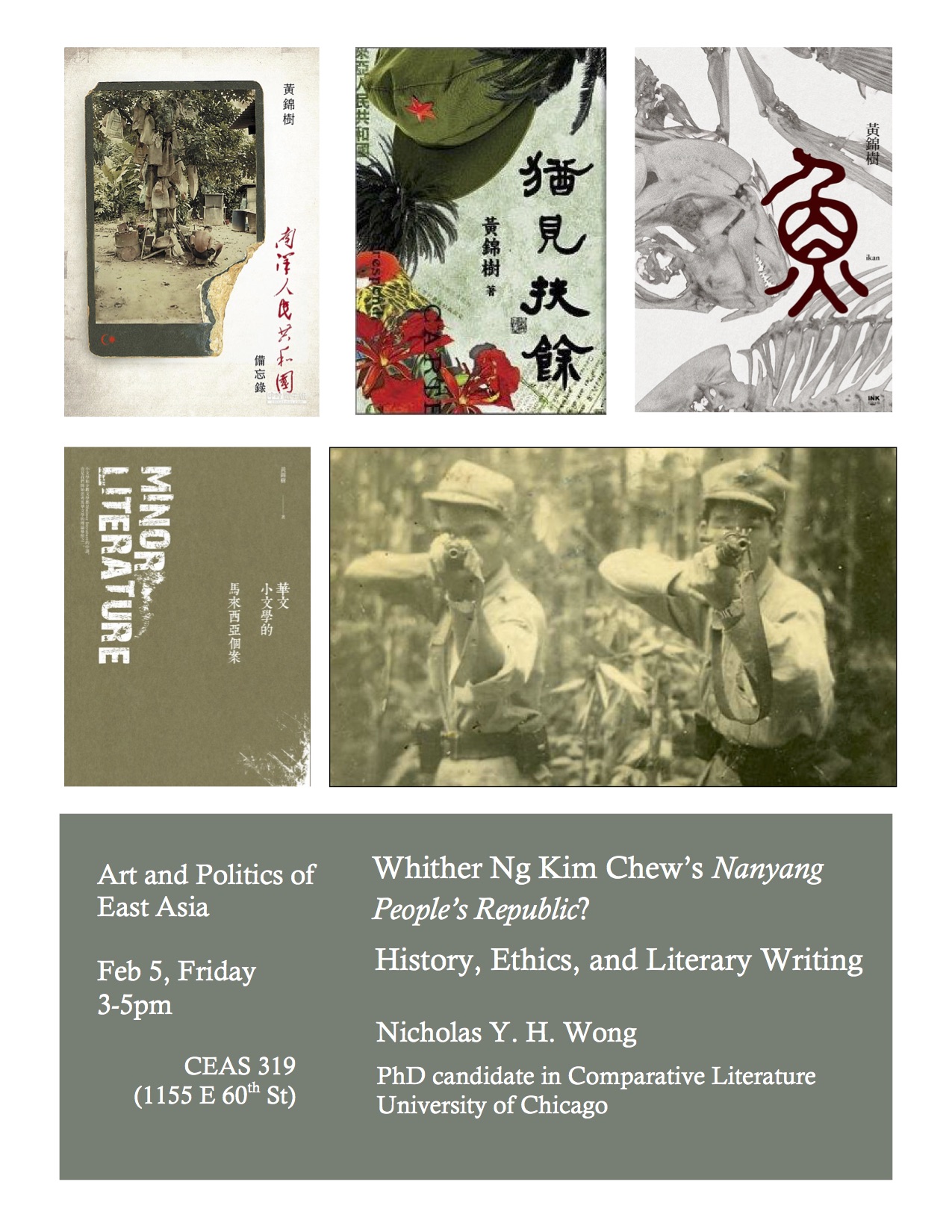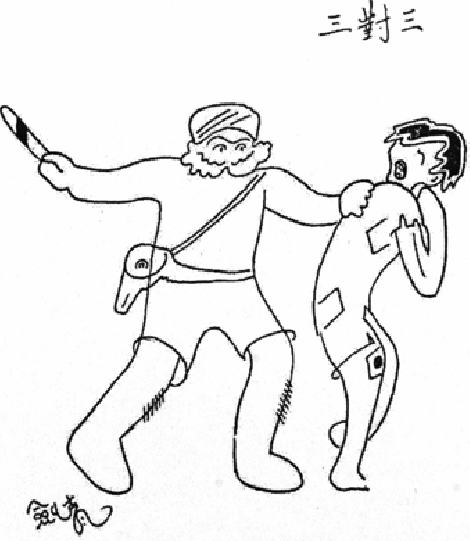China
Nic Wong
 Friday, February 5, 3:00-5:00 PM in CEAS 319 (1155 E 60th St.)
Friday, February 5, 3:00-5:00 PM in CEAS 319 (1155 E 60th St.)
Nic Wong, “Whither Ng Kim Chew’s Nanyang People’s Republic?: History, Ethics, and Literary Writing”
Please join us this Friday, February 5, as we welcome Nic Wong (Comparative Literature, University of Chicago), who will be presenting a chapter draft from his dissertation. As Nic summarizes, “In reading Ng Kim Chew (Huang Jinshu)’s recent fiction and essays, this chapter considers the genre of ‘Malayan communist writings’ (magong shuxie) as the site of the historical entanglement of literary movements of social(ist) realism and modernism in the wake of decolonization and nation-building movements during the Cold War. Ng’s imaginative anti-genealogy of ‘Malayan communist writings’ explores and critiques post-loyalist attachments to the bygone concepts of Nanyang and Malaya, and shrewdly introduces literariness as a form of ethics—a key term left out of discussions of materiality in Sinophone studies and studies of the genre.”
A draft of the chapter is available via this link. Please do not circulate or cite the chapter without permission of the author. If you have not received the password for the post, or if you have concerns about accessibility for this meeting, please do not hesitate to email David Krolikoski at davidkroli at uchicago.edu or Brian White at bmwhite at uchicago.edu.
Protected: Nic Wong paper
Ling Zhang
Friday, January 15, 3:00-5:00 PM in CEAS 319 (1155 E 60th St.)
Ling Zhang, “When the Left Eye Meets the Right Ear: Cinematic Fantasia and Comic Soundscape in City Scenes (1935)“
Please join us this Friday, January 15, as we welcome Ling Zhang (Cinema and Media Studies, University of Chicago). Ling will be presenting a mock job talk, so no paper will be pre-circulated for this meeting. She summarizes her talk as follows:
Uchiyama Kanzo (內山完造, 1885-1959), a renowned Japanese bookstore owner in Republican Shanghai, published an essay, Shanghai Soundscape (上海的聲音), in 1939. In this article, Uchiyama vividly depicts a motley mix of mundane sounds in Shanghai, including ambient sounds (birds calling and cicadas chirping) and human voices (peddlers and vendors shouting). This literary rendition of Shanghai sounds corresponds to the 1930s Shanghai sound culture and cinematic soundscape. This paper examines Chinese filmmaker Yuan Muzhi袁牧之 (1909-1978)’s musical-comedy City Scenes (都市風光, 1935)’s incorporation and reinvention of Hollywood and Soviet influence in terms of film sound technique and musical concepts. The film was hailed as “the first Chinese musical comedy” and praised for its audiovisual experimentations, as it was the first Chinese film to commission composers to create musical scores according to the cinematic style and thematic concerns. The film score created by three composers is a mixture of Western classical, Chinese folk, and popular musical genres that reflects the hodgepodge soundscape in semi-colonial Shanghai. These included Fantasia of City Scenes (都市風光幻想曲) by Huang Zi 黃自 (1904-1938), who studied composition at Yale University and was a respected composer in the European classical music tradition, and Song of the Peep-Show (西洋鏡歌) by Zhao Yuanren 趙元任 (1892-1982), who was a famed linguist and musician, versed in local dialects and folk tunes. The remaining music was arranged by He Luting賀綠汀, who composed numerous theme songs for 1930s and 1940s Chinese films, and whose music falls between classical and popular music conventions, with a Soviet-Russian tinge.
The comic and tumultuous soundscape in City Scenes corresponds to the popular sound culture in modern cityscape of Shanghai, which was permeated by popular songs, oral story-telling conventions, street performance and urban noises. I explore how the ingeniously experimental deployment of sound elements in City Scenes obscures and defies the conventionally conceived boundaries between the human voice, sound effects, and music, articulating a sort of “auditory grotesque”, comprised of unruly ironic reverberations and a dynamic soundscape. Moreover, these convoluted sound elements connect different narrative layers within the structure, and are associated with and comment on different characters, frequently through the form of Wagnerian leitmotif and a widely practiced sound technique in 1930s Hollywood animations and films with live actors, Mickey Mousing. Finally, I explore how the interactions between the acoustic and the visual enhance the textual and material heterogeneity in the film and create a sort of cinematic fantasia, which corresponds to the spontaneous film score and the implications of the musical form, fantasia. Consequently, the film’s playful yet rather bleak audiovisual rendition of city life in 1930s Shanghai foregrounds its pungent register as satirical social critique of hegemonic capitalism and consumerism.
If you have concerns about accessibility for this meeting, please do not hesitate to contact David Krolikoski at davidkroli at uchicago.edu or Brian White at bmwhite at uchicago.edu.
Paul Vierthaler
Friday, November 20, 12 – 2 PM in JRL 122
Paul Vierthaler, “Quantitative Historical Imagination: Late Ming and Early Qing Chinese Unofficial Histories, Novels, and Dramas”
Please join us for a joint session with the Digital Humanities Forum on Friday, November 20 at 12 PM in JRL 122. We will be welcoming. Paul Vierthaler Digital Humanities Postdoctoral Fellow at Boston College.
In this talk, Paul Vierthaler will discuss his research in using digital techniques to analyze the differences among texts that transmitted unofficial historical narratives in the late Ming and early Qing periods in China. This talk centers on novels on current events, dramas on current events, and yeshi (unofficial, or wild, histories). These texts, which Paul calls “quasi-histories”, purport to move information about recent events, but their historical validity and generic nature have been debated by contemporary and modern scholars. In the past, their sheer numbers made systematic analysis difficult. Paul will begin with a meta-analysis of extensive secondary bibliographic information to analyze the claim that late Ming and early Qing quasi-histories were unprecedentedly focused on the recent past. He will finish with a discussion on using stylometric analysis to explore the complex stylistic relationships among texts of these genres, and their relationship with official dynastic histories.
Ramona Curry

Friday, November 6, 10:30 AM – 12:30 PM in Cobb 311
Ramona Curry, “Pioneering Figures in Chinese Film in Los Angeles, 1918-1934”
Please join us for a joint session with the Mass Culture Workshop on Friday, November 6 at 10:30 AM in Cobb 311. We will be welcoming Ramona Curry, Associate Professor of English, Media and Cinema Studies, Gender and Women’s Studies, and Center for East Asian and Pacific Studies at the University of Illinois at Urbana-Champaign. She will discuss a section of “Pioneering Figures in Chinese Film in Los Angeles, 1918-1934,” a chapter from her book in progress, Trading in Cultural Spaces: How Chinese Film Came to America.
This workshop is being held in conjunction with a Film Studies Center event. A Trip Through China will be screened in Logan 201 on Thursday, Nov. 5 at 7:00 PM. This screening has been curated by Pao-Chen Tang, Ph.D. student in Cinema and Media Studies; Yuqian Yan, Ph.D. candidate in Cinema and Media Studies; and Zhang Ling, Ph.D. candidate in Cinema and Media Studies as part of the Film Studies Center’s Graduate Student Curatorial Program. This event is co-sponsored by the Center for East Asian Studies. This screening will include live piano accompaniment by Anthony Cheung and Lu Wang, and will conclude with a round table discussion featuring Prof. Curry. Please find full details for this event on the Film Studies Center’s website.
Refreshments will be provided at the workshop.
Prof. Curry’s paper is available for download at this link, along with supplementary readings from her book in progress. If you have not received the password for the post, or if you have concerns about accessibility, please feel free to contact David Krolikoski at davidkroli at uchicago.edu or Brian White at bmwhite at uchicago.edu.

Friday, May 1, 3:00-5:00PM in CEAS 319 (1155 E 60th St)
Adhira Mangalagiri (PhD Candidate in Comparative Literature, University of Chicago)
“Slave of the Colonizer: Reading the Indian Literary Figure in Chinese Literature”
This Friday at 3:00PM, please join the Art and Politics of East Asia Workshop for a presentation by Adhira Mangalagiri, PhD candidate in the Department of Comparative Literature, on representations of colonial Indian policemen in Chinese literature written between 1900 and 1940. The Indian policeman is persistently present in China’s, particularly Shanghai’s, literary production during the colonial period. However, this Indian figure has so far been treated as a historical figure, his function in literary texts often explained merely by accounting for the historical forces underlying his presence on the streets of Shanghai. Using postcolonial and psychoanalytic lineages of critical thought, Adhira argues that the Indian policeman is not simply a historical artifact lurking in the backgrounds of texts. Rather, she argues that he is a central feature of the Chinese literary psyche and is crucial for reading colonial anxieties in the short stories and novels of the period.
A draft of the chapter is available at this link. If you have not received the password for the post, please feel free to contact Nicholas Lambrecht at lambrecht at uchicago.edu. Light refreshments will be served at the workshop. We look forward to seeing you on Friday!
Protected: Adhira Mangalagiri paper
Friday, April 17, 3:00-5:00PM in CEAS 319 (1155 E 60th St)
Chun Chun Ting (PhD Candidate in EALC, University of Chicago)
“Redefining Neighborhoods: Documentary Filmmaking and
Political Empowerment in Hong Kong’s Inner City”
This Friday at 3:00PM, the Art and Politics of East Asia Workshop will meet for a presentation by Chun Chun Ting, PhD candidate in the Department of East Asian Languages and Civilizations, on the documentary films produced by the Hong Kong artist/activist group v-artivist. Ting’s paper, which can be found here, argues that these films tease out how working class life is continually eroded and overpowered by institutional forces while also showing how the spatial practices sustained in old neighborhoods nurture a spirit of local autonomy and agency. This vision of local life provides a source of critique not only of capitalist reproductions of urban space but also of capitalism as a way of organizing economic and social life. Ting’s paper specifically looks at v-artivist’s productive collaboration with residents facing redevelopment and their screening movement to explore how they transform the viewers’ relationship with images to cultivate a community of resistance. While bulldozers continue to raze many of these neighborhoods, Ting argues that the practices of v-artivist have substantially shifted the discussion about urban renewal from the nostalgic discourse of cultural heritage to one about housing rights and communal ownership, and as such redefine these neighborhoods as sites for the exercise of citizenship and collaboration.
If you have not received the password for the paper, or if you have concerns about accessibility, please feel free to contact Nicholas Lambrecht at lambrecht at uchicago.edu. Light refreshments will be served at the workshop. We look forward to seeing you on Friday!



